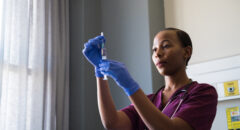
The facts are the facts.
Black people living with HIV and AIDs face a higher risk of all kinds of health-related issues. Not only do Black Americans account for nearly 40 percent of the U.S. population with HIV (despite being just ~14 percent of the population overall), but they also may carry certain other risk factors that increase the challenge of life with HIV.
But there’s plenty of hope. Let’s cover six unexpected challenges you may face and what to do.
1. Heart Disease
According to the Office of Minority Health, Black people are roughly 30 percent more likely to die from heart-related issues than non-whites. Unfortunately, HIV increases these risks further. According to one global analysis of heart disease among HIV patients, those with HIV are nearly twice as likely to have heart disease as those who do not.
While the reasons for this are still unclear, there is no need to excessively worry. In fact, the Black community has many ways to reduce these risks. Simple changes to diet, exercise, and stress in general can do wonders. Opt for lower-salt foods, less processed food, and a healthier balance of dark greens, lean meats, and whole grains.
As for exercise, get out and about, but keep it simple. Walking with light weights, practicing yoga, or simply practicing deep breaths are all ways to get exercise but keep your energy strong. These basic changes not only help with physical conditioning but change the chemistry of your brain, increasing positive emotions and reducing negative feelings associated with excess stress.
RELATED: Day 1: Just Diagnosed with HIV
2. Diabetes
Diabetes is a pain in the neck (and everywhere), but that doesn’t mean you need to suffer immensely from it. While HIV can increase your risk of diabetes and even make preexisting diabetes worse due to inflammation, you do have ways to treat it.
What do you do? Simple. Even though Black folks are as much as 60 percent more likely to be diagnosed compared to other races, this doesn’t mean your fate is sealed. While eating more organic foods and getting regular exercise are always recommended, don’t forget something else…
Medication. Talk to your doctor about alternatives to ‘nucleoside reverse transcriptase inhibitors.’ If you’re on drugs like stavudine, didanosine, or indinavir, you may be able to use alternative remedies.
3. General Anxiety Disorder
We all get anxious, but sometimes, it’s more. Generalized anxiety disorder refers to constant and often disruptive worrying about everyday things. These worries are out of proportion and can affect your ability to perform the normal ‘stuff’ you do and love.
It’s probably no wonder these issues would affect somebody with HIV. After all, you’ve got a lot on your plate! You’re thinking about issues with your health, your prognosis, and how you will manage your day-to-day life. You’re also likely considering any impacts on your friends and family.
If GAD is impacting you, consider support networks like the AIDS Healthcare Network and the CDC’s rich resources, as well as daily practices like mindfulness, stretching, and easy activities to clear your mind. You got this!
4. Lymphoma
Why is lymphoma so problematic among patients with HIV? Basically, HIV affects your immune system, making your cells more vulnerable to all ranges of ‘malignant conditions.’ In fact, one recent study found that from the years of 2004 to 2012, the Black HIV population showed the highest rates of Hodgkin lymphoma, comprising nearly half of all cases in 2012!
If you have this issue, the American Cancer Society has a good prognosis. Today’s HIV therapies are increasingly better at treating immune deficiency problems, so consult your doctor about potential treatments that boost your cellular defenses.
RELATED: Do You Know Your HIV/AIDS Status?
5. Opportunistic Infections (OIs)
One of the main issues associated with HIV is immune suppression. In other words, this means that your body is more vulnerable to all kinds of infections, illnesses, and diseases that would normally not affect you to that degree. But here’s the good news. There is a whole spectrum of antibiotics, antivirals, and even antifungals that help with your immunosuppression.
The list is pretty long, so be sure to consult your doctor about specific remedies that may work for you.
6. Kidney Disease
While this sounds ominous, it isn’t the end-all-be-all. If you have an increased kidney disease risk due to HIV, dialysis and kidney transplants are not necessarily required. Simpler measures to reduce blood pressure, balance your fluid intake, and more standard HIV therapies may be all you need.
As always, speak to your physician for a personalized treatment plan. Living with HIV does not have to be a life-disrupting, life-upending condition. While the Black community may be at greater risk, that doesn’t mean you have to suffer more severe consequences.
Thanks to powerful new medications, many people are living with HIV with relatively minor trouble.








